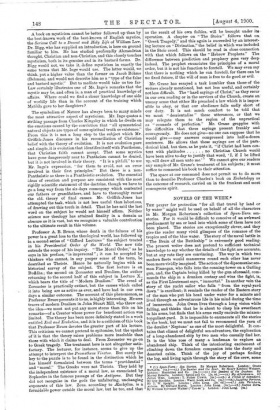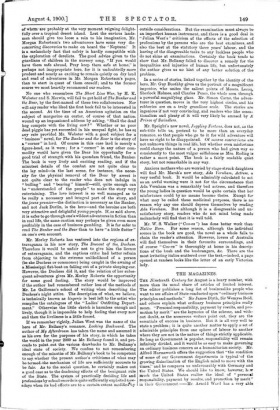NOVELS OF THE WEEK.*
THE prayer for protection "for all that travel by land or by water" might well be used on behalf of all the characters in Mr. Morgan Robertson's collection of Spun-Yarn sea- stories. For it would be difficult to conceive of an awkward predicament by sea or land into which some of them have not been placed. The stories are exceptionally clever, and they give the reader many vivid glimpses of the romance of the tropics and of the blue water. The story of the naval battle in "The Brain of the Battleship" is extremely good reading. The present writer does not pretend to sufficient technical knowledge to say whether the details of the fight are accurate, but at any rate they are convincing. The way in which two modern fleets would manceuvre round each other has never been more vividly imagined. The action of the dipsomaniac sea- man Finnegan, who falls into the conning-tower on a Gatling gun, and, the Captain being killed by the gun aforesaid, com- mands the ship in a drunken ecstasy and wins the fight, is, as the First Lieutenant says, " immortaL" In another vein the story of the yacht sailor who falls "from the royal-yard down" is excellent; it reminds the reader of the Eastern story of the man who put his head under water for a minute and lived through an adventurous life in his mind during the time of immersion. John Owen lives through a long vision while failing, and thinks that he is about to clasp his sweetheart in his arms, but finds that his arms really encircle the mizzen- topgallant-yard. It is impossible to enumerate all the stories in the book, but we must not fail to recommend the yarn of the derelict Neptune' as one of the most delightful. It con- tains that climax of delightful sea-adventure, the exploration of a long-abandoned ship by two men who casually find her. It is the blue rose of many - a landsman to explore an abandoned ship. Think of the intoxicating excitement of climbing down the forsaken companion into the dusty and deserted cabin Think of the joy of perhaps finding the log, and living again through the story of the crew, some • (1.) Spun-Yarn : Sea Stories. By Morgan Robertson. London : Grant Richards. tes.]—(2.) The Banker and the Bear. By Henry Kitchell Webster. London : Macmillan and Co. (6s.)—(3.) The Descent of the Duehees. By Morley Roberts. London : Sands and Co. [3.s. 6d.]—(4.) My Afterdream. By Julian West. London : T. Fisher Unwin. (6s.).-11.) A Prince of Swindlers. .By Guy Boothby. London : Ward, Lock, and Co. No —(e.) Juggling Fortune. By T. W. Spelght. London: John Long. Os. ad-1—(7.) Ada Vernharn, Actress. By Richard Marsh. London : John Long. [Gs.]—(8.) Native Born. By William Sylvester Walker ("coo-es'). London : John Long. [64.] wharae— probably at the very moment 'reigning delight- fully over a tropical desert island. Lest the envious lands- man should 'give too loose a rein to his imagination, Mr. Morgan Robertson's two adventurers have some very dis- coacerting discoveries to make on board the 'Neptune.' It le a melancholy fact that safety ie hardly compatible with the exploration of derelicts. The good -advice given to the gxiardians of. children in the nursery song, "If you would have them safe abroad, Pray keep them safe at home," is perhaps not inappropriate here, for it is undoubtedly more prudent and nearly as exciting to remain quietly on dry land and read of adventures in Mr. Morgan Robertson's pages, than to start in quest of them oneself; and to the former course we most heartily recommend our readers.
No one who remembers The Short Line War, by H. K. Webster and S. Merwin, will fail to get hold of The Banker and the Bear, by the first-named of these two collaborators. Nor will any reader 'who liked the first book fail to be interested in the second. At the time of an American agitation on the sabject of margarine an orator, of course of that nation, wound up an impassioned address by asking, "Shall the dead hog compete with the living co* ?" Whether or no poor dead piggia has yet succeeded in his unequal fight, he has at any rate provided Mr. Webster with a good subject fox:a " business " novel, for The Banker and the Bear is the story of a " corner " in lard. Of course in this case lard is merely a figure-head, as it were ; for a " corner " in any other com- modity would have given the Bear his opportunity for a good trial of strength with his quondam friend, the Banker. The book is very lively and exciting reading, and if the minutest details of the combat are not quite clear to the lay mind—in the last scene, for instance, the neces- sity for the physical removal of the Bear by arrest is not quite clear to the reader who does not indulge in " bulling " and " bearing " himself—still, quite enough can be " understanded of the people" to make the story very entertaining. The love interest is so well managed as to be really a necessary and integral part of the story, and the jeune premier—the distinction is necessary as the Banker, and not Jack Dorlin, is the hero—and the heroine are both vely attractive and delightful young people. If, as said above, it is safer to go through one's wildest adventures in fiction than in real life, the same caution may perhaps be given even more profitably in the case of business gambling. It is far safer to read The Banker and the Bear than to have "a little flutter" on one's own account.
Mr. Morley Roberts has ventured into the regions of ex- travaganza in his new story, The Descent of the Duchess. Therefore it would be unfair not to give him the license of extravaganza, and the captious critic had better refrain from objecting to the extreme unlikelihood of a person (be she Duchess or commoner) being caught in the awning of a Missiesippi flat-boat on falling out of a private sleeping-car. However, the Duchess did it, and the relation of her subse- quent adventures gives Mr, Morley Roberts the opportunity for some good fooling. The story would be improved if the author had remembered rather less of the methods of Mr. Le Gallienne's school of writing when describing the Duchess's night attire. The description of what, we believe, is technically known as lingerie is best left to the artist who compiles the catalogues of the "Ladies' Outfitting Depart- ment." Otherwise the little sketch is harmless enough and lively, though it is impossible to help feeling that every now and then the liveliness is a little forced. •
If we-remember rightly, Julian West was the name of the hero of. Mr: Bellamy'a romance, Looking Backward. The author of My Afterdream has taken the name and assumed it as his own for the purposes of his story, in which he takes the world in the year 2000 as Mr. Bellamy found it, and pro- ceeds to point. out the various drawbacks to Mr. Bellamy's ideal state of society. We confess to not remembering enough of the minutia) of Mr. Bellamy's book to be competent to say. whether the present author's criticisms of what may be-termed-the meohanism of life are sufficiently accurate to be fair. As to the social question, he certainly makes out a good case as to the deadening effects of the benignant rule of the State. The system of practically deciding life and professions by school records is quite sufficiently, exploited now- adays when its bad effects are tO a certain extent modifiectlby outside considerations. But the examination mast always be an imperfect haman instrument, and there is a good , deal in "Julian West's" criticism of the effects of the selection of professions by the persons who are the best examinees, and also the best at the statutory three years' labour, and the leaving of the disagreeable tasks to any luckless people who do not shine at examinations. Certainly the book tends to show that M. Bellamy failed to discover a remedy for the inequalities and injustice of human life, but unfortunately the author gives us no hint of any better solution of the problem.
In a series of stories, linked together by the identity of the hero, Mr. Guy Boothby gives us the portrait of a magnificent impostor, who unites the salient points of Messrs. Lecoq, Sherlock Holmes, and Charles Peace, the whole seen through a powerful magnifying glass. Mr. Simon Carne, the adven- turer in question, moves in the very highest circles, and his robberies are on a truly grandiose scale. The stories are ingenious if not very convincing, and readers who like sensa- tionalism and plenty of it will very likely be amused by A Prince of Swindlers.
Mr. Speight's new novel, Juggling Fortune, does not, as the sub-title tells us, pretend to be more than an everyday romance, so that people who go to it for wild adventure will have no right to be disappointed. Of course conversions are not unknown things in real life, but whether even misfortune could change the nature of a person who had given way so consistently to the most vulgar selfishness as Mr. Roding is rather a moot point. The book is a fairly readable quiet story, but not remarkable in any way.
Anxious mothers who are worried by stage-struck daughters will find Mr. Marsh's new story, Ada Vernham, Actress, a very useful book. It would be admirably calculated to act as an awful warning were it not for the circumstance that Ada Vex-ahem was a remarkably bad actress, and therefore the young ladies in question would be quite certain that her misfortunes could by no means become theirs. Except for what may be called these medicinal purposes, there is no reason, why any one should depress themselves by reading Ada Vernham. But although it is a disagreeable and un- satisfactory story, readers who do not mind being made melancholy will find that it is well told.
Mr. W. S. Walker (" Coo-ee ") has done better Work than' Native Born. For some reason, although the individual scenes in the book are good, the novel as a whole fails, to chain the reader's attention. However, lovers of Australia will find. themselves in their favourite surroundings, and of course " Coo-ee" is thoroughly at home in his descrip- tions of the bush and the bushrangers, &e. There are the most irritating italics scattered over the text,—indeed, a page opened at random looks like the letter of an early Victorian lady.



































 Previous page
Previous page